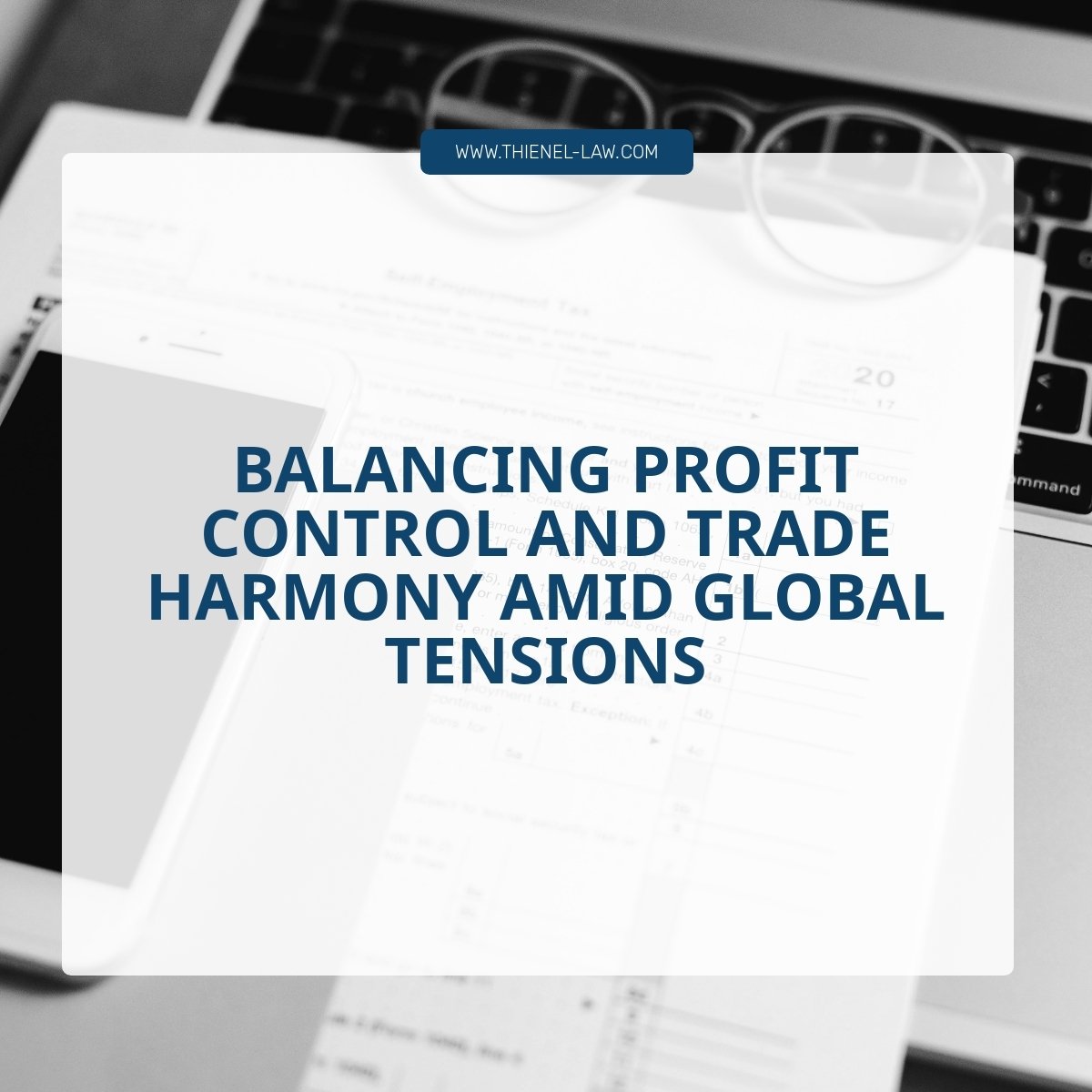
Strategic Tax Planning
There are many options when it comes to selecting the right professional to help you with your strategic tax planning. Whether you are a business or an individual, Thienel Law understands the importance of minimizing your tax liability. Given the complexity of the Internal Revenue Service, you need someone knowledgeable in tax law to ensure you take advantage of every tax deduction and tax credit available to you.
When making any financial decision, it is important to consider the tax implications. Strategic tax planning can save individuals and businesses a substantial amount of money. Taxation attorney Steve Thienel possesses the breadth of knowledge and understanding of the tax code to answer any particular questions about your unique circumstances.
Strategic Tax Planning for Individuals
With the overhaul of the tax code accomplished, many Americans are wondering how a vastly altered tax code will affect their financial planning. In particular, the alternative minimum tax, the net investment tax, and the standard deduction are set to radically change for 2018. Tax planning attorney Steve Thienel is dedicated to staying up-to-date on the tax code and will pore over every new provision to ensure you are maximizing your income and minimizing your tax burden.
For high-net-worth individuals, Steve Thienel is well-versed in comprehensive tax planning strategies. For these individuals, careful attention is required to both the taxpayer’s income and assets and the evolving tax code’s effect on them. Under the new tax code, popular investment strategies like homeownership will see some of their tax benefits significantly curtailed over the coming year.
At the same time, the reformed tax code will significantly lower taxes on business entities – creating a possible opportunity for high-earning taxpayers to reduce tax liability by turning into a corporation. The earnings from the corporation will now be taxed at a much lower rate – at 21 percent, a full 14 percent reduction in corporate taxes. Further, while American taxpayers may only deduct up to $10,000 each year in state and local taxes, corporations are still allowed to deduct the entire amount. For high-earning taxpayers that will not need the income during their lifetime, a C-corporation can even be an effective estate planning tool. If a taxpayer is able to maximize deductions in a way that reduces the corporation’s profit to a much smaller number and then refusing to distribute the corporation’s assets to himself, the taxpayer has created an almost tax-free way to distribute assets to his heirs.
For taxpayers that may need more liquidity, a limited liability company may be a better vehicle to tap income. Many business entities that utilize pass-through income can now deduct up to 20 percent of profits on their individual tax returns. If a taxpayer were to structure himself or herself as a limited liability, potentially he or she could now have their tax burden reduced to only 80 percent of income that would have been taxable in the previous year. For wealthy Americans on the cusp of the higher tax brackets, strategic tax planning can be particularly beneficial.
Strategic Tax Planning for Estate Planning
Tax preparation is essential to all estate planning. The attorneys at Thienel Law will make sure that all proper procedures are followed, and your estate wishes are carried out with the lowest tax burden possible. When estate planning, there are multiple taxes to avoid – inheritance taxes, estate taxes, and income taxes. Without proper planning, those taxes may eat into a large portion of the estate.
Here are several popular ways to reduce tax liabilities on an estate:
Marital Transfers. As long as both spouses in a marriage are American citizens, any lifetime gifts or bequests at death will not be subject to the estate taxes.
Gifts to Heirs. As of 2017, every taxpayer can gift $14,000 each year without paying taxes on the gift. For a married couple, that amount increases to $28,000 each year. With proper planning, this can be a popular vehicle to begin transferring an inheritance that would otherwise be taxable income, or subject to estate taxes, upon death.
Family Limited Partnership. A family limited partnership pools together an entire family’s assets into a single family-owned business partnership. The family members then own “shares” of the family limited partnership. Because this is technically a business entity, the assets are not owned by any single member of the family and thus are not included in the estate when he or she passes away.
Qualified Family-Owned Business Interest. For income derived from a family business, the IRS allows taxpayers to take a deduction from the gross estate. There are several qualifying factors to take advantage of this tax break:
The decedent or family members must have owned or otherwise operated the business for at least five of the immediately preceding eight years.~The decedent or family members must together own over 50 percent of the business.
~The business interest must comprise over 50 percent of the decedent’s estate.
~The business is located in the United States.
~The decedent was U.S. Citizen or legal resident.
Irrevocable Education Trust. For parents or grandparents that want to ensure their children or grandchildren will have the opportunity to afford a college education, an irrevocable education trust can be a beneficial estate planning tool. While contributions to an education trust significantly limit the flexibility of the money, it is a very advantageous vehicle for saving on personal taxes.
Strategic tax planning can help ensure that your assets are kept in the family, instead of being paid out to government agencies.
Strategic Tax Planning for Business
Buying Or Selling A Business
Many factors influence the decision to purchase or sell a business. Among those, the tax implications should be one of the most important. Under the current tax structure, adopting a multi-year purchase strategy can typically go a long way in reducing the tax burden for both those looking to purchase a business and those looking to sell one. By receiving all of the proceeds of at closing, a buyer is likely to push his taxable income into higher brackets than if he or she had adopted a deferred compensation or installment strategy for the purchase.
Forming A Business
When deciding to form a business, an important part of strategic tax planning is entity selection. In addition to concerns about personal liability, certain entities may be subject to double-taxation or certain tax deductions.
Here are the most popular forms of corporate entities, and a brief breakdown of their advantages and disadvantages:
C-Corporations. A C-Corporation is a popular business entity, especially for large businesses. Corporations listed on stock markets are typically C-Corporations. While they separate business and personal assets and thus prevent personal liability on business assets, they typically have unfavorable tax treatment compared to other forms. This is because C-Corporations are subject to “double taxation” where the company’s profits are taxed when they are earned, and then taxed again when they are distributed to shareholders. In addition to its unfavorable tax treatment, federal and state law also impose a slew of requirements for these businesses – including mandatory annual meetings.
S-Corporations. Similar, to a C-Corporation, an S-Corporation separates business and personal assets, meaning the owners of an S-Corporation will not have to worry that creditors may attack their personal assets. However, unlike a C-Corporation, an S-Corporation does not have double-taxation. Instead, this corporate entity utilizes “pass-through taxation” where the business profits are allocated and taxed to the individual shareholders. There are several requirements for a business to qualify as an S-Corporation, which include limits on the number of shareholders and a requirement that all shareholders be American citizens.
Limited Liability Companies. Limited liability companies have become increasingly popular in recent decades because of their combination of favorable tax treatment and reduced personal liability. Similar to the previous two business entities, limited liability companies separate business and personal assets allowing the owner to avoid personal liability for the business debts. Limited liability companies are similar to an S-Corporation in that limited liability companies utilize “pass-through taxation” meaning the profits from the business are only taxed once. Unlike an S-Corporation, though, limited liability companies do not have the onerous shareholding requirements.
Sole Proprietorships and Partnerships. Sole Proprietorships and Partnerships are both the easiest business entity to create–and usually the worst option. While there is no state filing required – the law assumes a sole proprietorship or partnership has been created merely when someone starts operating a business without filing any other entity documentation with the state – these two business forms both impose personal liability on the business owners. This unnecessary exposure to liability is easily avoided by using an LLC or S-Corporation, which also have the same “pass-through” taxation benefits. Partnerships are especially problematic because a partner will be liable for the business debts, even when they are incurred by the other partner, and sometimes even without his or her permission.
Experience You Can Trust
Tax planning attorney Steve Thienel is dedicated to strategic tax planning and tax preparation for any person, business, or legal entity. With knowledge of the complex and overlapping realms of the tax code and business law or estate planning, Thienel Law can ensure all of your tax obligations are satisfied in the most efficient manner.
You Might Also Be Interested In…
The Ultimate Guide to Surviving a Federal Tax Audit
What do you do when that envelop with the IRS return-address stamped is haunting you from the counter-top? Well, my advice is this - Don't Panic! This informative ebook will get you through the basics and help you make it through an IRS audit as painlessly as possible.












